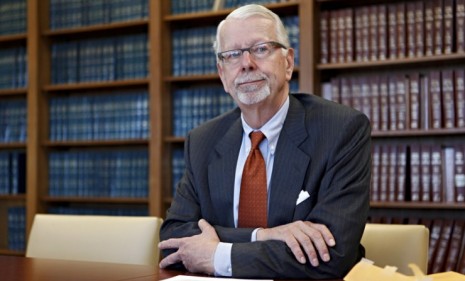The Prop 8 judge is gay: Does it matter?
Gay-marriage opponents protest after it's confirmed that the judge who overturned California's gay-marriage ban is himself gay

A free daily email with the biggest news stories of the day – and the best features from TheWeek.com
You are now subscribed
Your newsletter sign-up was successful
Vaughn Walker, the retired judge who overturned California's gay-marriage ban, Prop 8, has confirmed that he himself is gay and in a long-term relationship — prompting conservatives to try to get Prop 8 reinstated. Gay-marriage opponents have long complained that Walker was biased, citing rumors about his sexuality. Now they say he should have recused himself to avoid suggestions that his interest in marrying his boyfriend influenced his decision. Did Walker have a conflict of interest?
Walker clearly had something to gain: The problem is not Walker's sexual preference, says Ed Whelan at National Review. It's that he was involved with a man while he was hearing the case. "A reasonable person would think that Walker would have a strong present interest in conferring on himself a right to marry his same-sex partner." That's pretty much the definition of a conflict of interest, so it's perfectly reasonable to question Walker's impartiality.
"Re: Vaughn Walker's belated revelation"
The Week
Escape your echo chamber. Get the facts behind the news, plus analysis from multiple perspectives.

Sign up for The Week's Free Newsletters
From our morning news briefing to a weekly Good News Newsletter, get the best of The Week delivered directly to your inbox.
From our morning news briefing to a weekly Good News Newsletter, get the best of The Week delivered directly to your inbox.
What a ludicrous attack: "The idea that a gay judge in a long-term relationship can’t rule on gay marriage is beyond silly," says the Newark Star-Ledger in an editorial. Would the clowns defending Prop 8 have claimed that the late Justice Thurgood Marshall should not have had a say in the Supreme Court's desegregation rulings because he was black, since "he and his family might have benefited?" Prop 8's problem is that it lets the majority deny a minority basic rights. Walker's love life is irrelevant.
This logic would disqualify every judge: Prop 8's defenders claim that gay marriage is so damaging to the institution of marriage that the government has a vital interest in preventing it, says Adam Serwer at The Washington Post. The trouble is, by that logic, "a heterosexual, married judge could be seen as having just as much 'skin in the game' as Judge Walker." Gay-marriage opponents clearly think that straight judges can be impartial, but gay ones can't.
"Opponents of gay marriage getting slimy and desperate"
A free daily email with the biggest news stories of the day – and the best features from TheWeek.com
-
 AI surgical tools might be injuring patients
AI surgical tools might be injuring patientsUnder the Radar More than 1,300 AI-assisted medical devices have FDA approval
-
 9 products to jazz up your letters and cards
9 products to jazz up your letters and cardsThe Week Recommends Get the write stuff
-
 ‘Zero trimester’ influencers believe a healthy pregnancy is a choice
‘Zero trimester’ influencers believe a healthy pregnancy is a choiceThe Explainer Is prepping during the preconception period the answer for hopeful couples?
-
 The billionaires’ wealth tax: a catastrophe for California?
The billionaires’ wealth tax: a catastrophe for California?Talking Point Peter Thiel and Larry Page preparing to change state residency
-
 Bari Weiss’ ‘60 Minutes’ scandal is about more than one report
Bari Weiss’ ‘60 Minutes’ scandal is about more than one reportIN THE SPOTLIGHT By blocking an approved segment on a controversial prison holding US deportees in El Salvador, the editor-in-chief of CBS News has become the main story
-
 Has Zohran Mamdani shown the Democrats how to win again?
Has Zohran Mamdani shown the Democrats how to win again?Today’s Big Question New York City mayoral election touted as victory for left-wing populists but moderate centrist wins elsewhere present more complex path for Democratic Party
-
 Millions turn out for anti-Trump ‘No Kings’ rallies
Millions turn out for anti-Trump ‘No Kings’ ralliesSpeed Read An estimated 7 million people participated, 2 million more than at the first ‘No Kings’ protest in June
-
 Ghislaine Maxwell: angling for a Trump pardon
Ghislaine Maxwell: angling for a Trump pardonTalking Point Convicted sex trafficker's testimony could shed new light on president's links to Jeffrey Epstein
-
 The last words and final moments of 40 presidents
The last words and final moments of 40 presidentsThe Explainer Some are eloquent quotes worthy of the holders of the highest office in the nation, and others... aren't
-
 The JFK files: the truth at last?
The JFK files: the truth at last?In The Spotlight More than 64,000 previously classified documents relating the 1963 assassination of John F. Kennedy have been released by the Trump administration
-
 'Seriously, not literally': how should the world take Donald Trump?
'Seriously, not literally': how should the world take Donald Trump?Today's big question White House rhetoric and reality look likely to become increasingly blurred